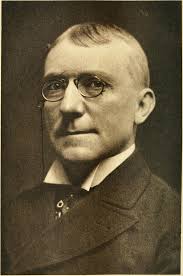Armazindy Page #10
James Whitcomb Riley poems book published in the 1894 book Armazindy and received very negative reviews that referred to poems like "The Little Dog-Woggy" and "Jargon-Jingle" as "drivel" and to Riley as a "worn out genius". Most of his growing number of critics suggested that he ignored the quality of the poems for the sake of making money.
“An old printer,” whispered John, answering my look,—“and we’re in luck:—He’s a genius, ’y God! and an Englishman, and knows Dickens personally—used to write races with him, and’s got a manuscript of his in his ‘portmanteau,’ as he calls an old oil-cloth knapsack with one lung clean gone. Excuse this extra light.—Old man’s lamp’s like a sore eye, and he’s going to touch up the Dickens sketch for us! Hear?—For us—for ‘The Criterion.’ Says he can’t sleep—he’s in distress—has a presentiment—some dear friend is dying—or dead now—and he must write—write!” This is, in briefest outline, the curious history of the subjoined sketch, especially curious for the reason that the following morning’s cablegram announced that the great novelist, Charles Dickens, had been stricken suddenly and seriously the night previous. On the day of this announcement—even as “The Criterion” was being read to perfunctorily interested visitors of The Greenfield Graded Schools—came the further announcement of Mr. Dickens’s death. The old printer’s manuscript, here reproduced, is, as originally, captioned— TWIGGS AND TUDENS “Now who’d want a more cosier little home than me and Tude’s got here?” asked Mr. Twiggs, as his twinkling eyes swept caressingly around the cheery little room in which he, alone, stood one chill December evening as the great St. Paul’s was drawling six. “This ain’t no princely hall with all its gorgeous paraphanaly, as the play-bills says; but it’s what I calls a’ ‘interior,’ which for meller comfort and cheerful surroundin’s ain’t to be ekalled by no other ‘flat’ on the boundless, never-endin’ stage of this existence!” And as the exuberant Mr. Twiggs rendered this observation, he felt called upon to smile and bow most graciously to an invisible audience, whose wild approval he in turn interpreted by an enthusiastic clapping of his hands and the cry of “Ongcore!” in a dozen different keys—this strange acclamation being made the more grotesque by a great green parrot perched upon the mantel, which, in a voice less musical than penetrating, chimed in with “Hooray for Twiggs and Tudens!” a very great number of times. “Tude’s a queer girl,” said Mr. Twiggs, subsiding into a reflective calm, broken only by the puffing of his pipe, and the occasional articulation of a thought, as it loitered through his mind. “Tude’s a queer girl!—a werry queer girl!” repeated Mr. Twiggs, pausing again, with a long whiff at his pipe, and marking the graceful swoop the smoke made as it dipped and disappeared up the wide, black-throated chimney; and then, as though dropping into confidence with the great fat kettle on the coals, that steamed and bubbled with some inner paroxysm, he added, “And queer and nothink short, is the lines for Tude, eh? “Now s’posin’,” he continued, leaning forward and speaking in a tone whose careful intonation might have suggested a more than ordinary depth of wisdom and sagacity,—“s’posin’ a pore chap like me, as ain’t no property only this-’ere ‘little crooked house,’ as Tude calls it, and some o’ the properties I ’andles at the Drury—as I was a-sayin’,—s’posin’ now a’ old rough chap like me was jest to tell her all about herself, and who she is and all, and not no kith or kin o’ mine, let alone a daughter, as she thinks—What do you reckon now ’ud be the upshot, eh?” And as Mr. Twiggs propounded this mysterious query he jabbed the poker prankishly in the short-ribs of the grate, at which the pot, as though humoring a joke it failed to comprehend wholly, set up a chuckling of such asthmatic violence that its smothered cachinnations tilted its copper lid till Mr. Twiggs was obliged to dash a cup of water in its face. “And Tude’s a-comin’ of a’ age, too,” continued Mr. Twiggs, “when a more tenderer pertecter than a father, so to speak, wouldn’t be out o’ keepin’ with the nat’ral order o’ things, seein’ as how she’s sorto’ startin’ for herself-like now. And it’s a question in my mind, if it ain’t my bounden duty as her father—or ruther, who has been a father to her all her life—to kindo’ tell her jest how things is, and all—and how I am, and everythink,—and how I feel as though I ort’o stand by her, as I allus have, and allus have had her welfare in view, and kindo’ feel as how I allus—ort’o kindo’—ort’o kindo’”—and here Mr. Twiggs’s voice fell into silence so abruptly that the drowsy parrot started from its trance-like quiet and cried “Ortokindo! Ortokindo!” with such a strength of seeming mockery that it was brushed violently to the floor by the angry hand of Mr. Twiggs and went backing awkwardly beneath the table. “Blow me,” said Mr. Twiggs, “if the knowin’ impidence of that-’ere bird ain’t astonishin’!” And then, after a serious controversy with the draught of his pipe, he went on with his deliberations. “Lor! it were jest scrumptious to see Tude in ‘The Iron Chest’ last night! Now, I ain’t no actur myself,—I’ve been on, of course, a thousand times as ‘fillin’,’ ‘sogers’ and ‘peasants’ and the like, where I never had no lines, on’y in the ‘choruses’; but if I don’t know nothin’ but ‘All hail!—All hail!’ I’ve had the experience of bein’ under the baleful hinfluence of the hoppery-glass, and I’m free to say it air a ticklish position and no mistake. But Tude! w’y, bless you, she warn’t the first bit flustered, was she? ’Peared-like she jest felt perfectly at home-like—like her mother afore her! And I’m dashed if I didn’t feel the cold chills a-creepin’ and a-crawlin’ when she was a-singin’ ‘Down by the river there grows a green willer and a-weepin’ all night with the bank for her piller’; and when she come to the part about wantin’ to be buried there ’while the winds was a-blowin’ close by the stream where her tears was a-flowin’, and over her corpse to keep the green willers growin’,’ I’m d—d if I didn’t blubber right out!” And as the highly sympathetic Mr. Twiggs delivered this acknowledgment, he stroked the inner corners of his eyes, and rubbed his thumb and finger on his trousers. “It were a tryin’ thing, though,” he went on, his mellow features settling into a look not at all in keeping with his shiny complexion—“it were a tryin’ thing, and it air a tryin’ thing to see them lovely arms o’ hern a-twinin’ so lovin’-like around that-’ere Stanley’s neck and a-kissin’ of him—as she’s obleeged to do, of course—as the ‘properties’ of the play demands; but I’m blowed if she wouldn’t do it quite so nat’ral-like I’d feel easier. Blow me!” he broke off savagely, starting up and flinging his pipe in the ashes, “I’m about a-comin’ to the conclusion I ain’t got no more courage’n a blasted school-boy! Here I am old enough to be her father—mighty nigh it—and yet I’m actually afeard to speak up and tell her jest how things is, and all, and how I feel like I—like I—ort’o—ort’o—” “Ortokindo! Ortokindo!” shrieked the parrot, clinging in a reversed position to the under-round of a chair.—“Ortokindo! Ortokindo! Tude’s come home!—Tude’s come home!” And as though in happy proof of this latter assertion, the gentle Mr. Twiggs found his chubby neck encircled by a pair of rosy arms, and felt upon his cheek the sudden pressure of a pair of lips that thrilled his old heart to the core. And then the noisy bird dropped from its perch and marched pompously from its place of concealment, trailing its rusty wings and shrieking, “Tude’s come home!” at the top of its brazen voice.
Translation
Translate and read this book in other languages:
Select another language:
- - Select -
- 简体中文 (Chinese - Simplified)
- 繁體中文 (Chinese - Traditional)
- Español (Spanish)
- Esperanto (Esperanto)
- 日本語 (Japanese)
- Português (Portuguese)
- Deutsch (German)
- العربية (Arabic)
- Français (French)
- Русский (Russian)
- ಕನ್ನಡ (Kannada)
- 한국어 (Korean)
- עברית (Hebrew)
- Gaeilge (Irish)
- Українська (Ukrainian)
- اردو (Urdu)
- Magyar (Hungarian)
- मानक हिन्दी (Hindi)
- Indonesia (Indonesian)
- Italiano (Italian)
- தமிழ் (Tamil)
- Türkçe (Turkish)
- తెలుగు (Telugu)
- ภาษาไทย (Thai)
- Tiếng Việt (Vietnamese)
- Čeština (Czech)
- Polski (Polish)
- Bahasa Indonesia (Indonesian)
- Românește (Romanian)
- Nederlands (Dutch)
- Ελληνικά (Greek)
- Latinum (Latin)
- Svenska (Swedish)
- Dansk (Danish)
- Suomi (Finnish)
- فارسی (Persian)
- ייִדיש (Yiddish)
- հայերեն (Armenian)
- Norsk (Norwegian)
- English (English)
Citation
Use the citation below to add this book to your bibliography:
Style:MLAChicagoAPA
"Armazindy Books." Literature.com. STANDS4 LLC, 2025. Web. 10 Mar. 2025. <https://www.literature.com/book/armazindy_946>.








Discuss this Armazindy book with the community:
Report Comment
We're doing our best to make sure our content is useful, accurate and safe.
If by any chance you spot an inappropriate comment while navigating through our website please use this form to let us know, and we'll take care of it shortly.
Attachment
You need to be logged in to favorite.
Log In